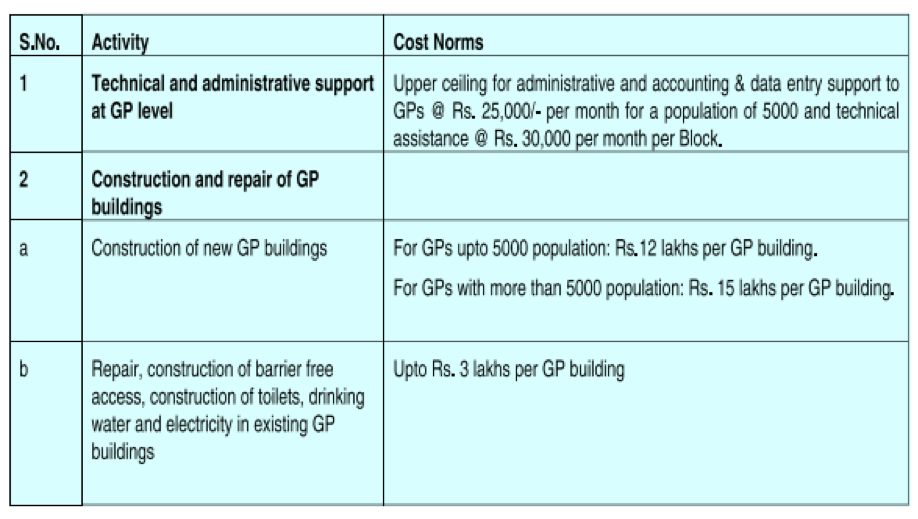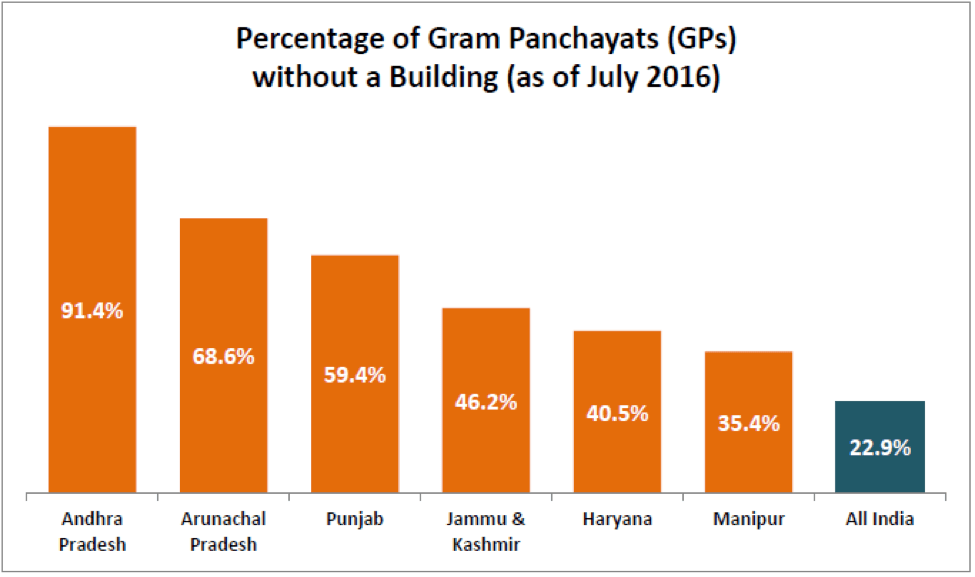[orc]As per the data shared in the Lok Sabha, more than 56000 GPs do not have a building of their own out of the 2.48 lakh GPs in the country. Leading this list is the state of Andhra Pradesh with more than 11800 GPs without a building out of more than 12900 GPs.
Gram Panchayat is the lowest tier of governance in India where the elected representatives are closest to the rural citizenry. Thus the Panchayat institution is a very important cog in the governance wheel and its efficient functioning has the potential to bring in transformative changes. But Panchayats in general suffered from lack of Funds, Functions & Functionaries. As per the data shared by the government, more than 56000 Panchayats (23%) do not have a building of their own while in Andhra Pradesh, more than 90% of the Panchayats do not have a building of their own.
The Rajiv Gandhi Panchayat Sashaktikaran Abhiyan (RGPSA)
The RGPSA was launched in 2013 to strengthen the Panchayati Raj system across the country and address critical gaps that constrain its success. The scheme was launched to address the following issues
- Enhance capacities and effectiveness of Panchayats and the Gram Sabhas
- Enable democratic decision-making and accountability in Panchayats and promote people’s participation
- Strengthen the institutional structure for knowledge creation and capacity building of Panchayats
- Promote devolution of powers and responsibilities to Panchayats according to the spirit of the Constitution and PESA Act
- Strengthen Gram Sabhas to function effectively as the basic forum of people’s participation, transparency and accountability within the Panchayat system
- Create and strengthen democratic local self-government in areas where Panchayats do not exist
- Strengthen the constitutionally mandated framework on which Panchayats are founded
One of the activities included in the state plan of this scheme is funding for the construction of Gram Panchayat (GP) buildings. In general, States are expected to obtain funds for Gram Panchayat buildings from various sources, especially through schemes of the Ministry of Rural Development. However, where funds cannot be accessed from other schemes, RGPSA will fund new Gram Panchayat buildings, repair of existing buildings, construction of barrier free access, construction of toilets (including separate toilets for women), electricity and water supply connections.
The funding of RGPSA for State plans will be on a 75:25 sharing basis by the Central and State Governments respectively. For North Eastern States (NE States), this ratio will be 90:10. A State may also spend up to 25% of its plan funds on construction and repair of GP buildings. Cost of land will not be funded under the scheme. The cost norms for the construction of GP buildings are like the following.

More than 90% GPs in Andhra Pradesh without a Building
As per the data shared in the Lok Sabha, more than 56000 GPs do not have a building of their own out of the 2.48 lakh GPs in the country. In other words, 23% of the GPs do not have a building of their own. Leading this list is the state of Andhra Pradesh with more than 11800 GPs without a building out of more than 12900 GPs in the state. This is about 91% of the GPs without a building, the highest in the country by quite a margin. Interestingly, the state of Telangana which was formed after the bifurcation of the erstwhile United Andhra Pradesh has only 275 GPs without a building out of a total of 8695 GPs, a mere 3.2%. More than 30% GPs are without a building in six (6) different states. In twelve (12) different states, less than 10% of the GPs are without a building. None of the GPs are without a building in Karnataka while only 3 out of the 941 GPs are without a building in Kerala.

Featured image source:By Gazal Aga (Own work) [CC BY-SA 3.0], via Wikimedia Commons



2 Comments
Thanks for the info . Very useful .
Pingback: Locked and Defunct: How Panchayats Work in Pulwama